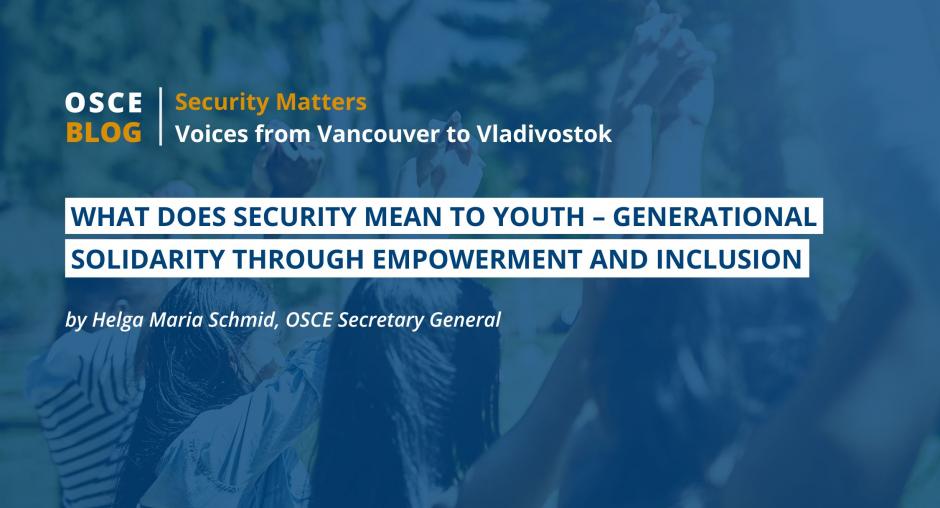What does security mean to youth – generational solidarity through empowerment and inclusion

Including youth voices in decision-making processes is not just the right thing to do, it’s essential. Sustainability of our collective efforts to promote security and stability for future generations requires dialogue and solidarity with younger generations.
Beyond the socio-economic impact of the COVID-19 pandemic, young people face rising inequality, the climate crisis and conflict – including Russia’s war against Ukraine. Yet, despite the immensity of these challenges and insecurity of their future, young people continue to advocate unfalteringly for decisive action to tackle corruption, gender inequality, climate change, democracy, human rights, unemployment, war, and much more.
Across the OSCE region, young women especially face barriers to political and economic opportunities, and are disproportionately affected by discrimination and violence. They are also underrepresented at the policymaking level and lack role models within these institutions, as less than one per cent of parliamentarians globally are women.
To empower youth, and especially women, the OSCE has made it a priority to create opportunities for young women and men to increase their political agency, strengthen their capacity to prevent conflict and build peaceful and inclusive societies.
Including youth perspectives for a secure and sustainable future
At the OSCE, we directly incorporate youth perspectives into our work and to give them a voice at the policymaking level. For example, in April 2022, the OSCE Project Co-ordinator in Ukraine in co-operation with the Ministry of Youth and Sports of Ukraine brought together youth to envision a post-war development of civic competencies of Ukrainian youth. The future work of the OSCE in Ukraine will also build on recommendations from this meeting.
Our Perspectives 20-30 Initiative provides a platform to integrate the perspectives of young people with policymaking, holding consultations with youth across the OSCE region to inform our work and engage policymakers in their respective countries. By giving young people a place at the table, we deepen our understanding of their important contributions to peace and security, not only as beneficiaries, but as essential partners.
Building youth capacity and empowerment
The OSCE Academy in Bishkek fosters regional security dialogue and provides advanced education and research for young professionals. The Academy provides training and education in human rights, conflict prevention, management, resolution, post-conflict rehabilitation, and in economics to contribute to ensuring a sustainable development and prosperity in Central Asian countries.
Since 2015, the OSCE Summer School has provided a space for networking and dialogue for over 100 young women and men, in support of the OSCE’s engagement in the Geneva International Discussions. In addition, the OSCE Model Conference organized in Georgia in 2019 revived the tradition of the regional Model Conferences geared towards empowering young people with different ethnic and cultural backgrounds from the South Caucasus by enhancing their knowledge and skills of OSCE values and principles.
Furthermore, the OSCE Documentation Centre in Prague hosts educational programmes to promote the use of its extensive record holdings and to share information on the OSCE’s work. In times when OSCE principles and values are constantly called into question, preserving the institutional memory and standards is as important as ever.
We also empower young people for a fair digital transition by supporting young innovators and enabling an ecosystem for social start-ups to promote opportunities for a new generation of change makers. Social enterprises led by young people are the lifeblood for socially oriented businesses that put people over profits, prefer democratic governance, preserve the environment, and reinvest dividends for the sake of a common good.
Countering intolerance and violent extremism, preventing crime and fighting corruption
Our Transnational Threats Department and OSCE Field Operations have implemented the Leaders against Intolerance and Violent Extremism initiative, providing skills and knowledge to young leaders to help them build resilience to violent extremism in their communities and to actively counter it. We also support participating States in enhancing youth crime prevention and youth resilience to organized crime, corruption and drug use by exchanging best practices and cooperation; delivering workshops for on youth-sensitive early crime prevention, and through social media awareness campaigns.
Empowering young women in military and environmental activities
Youth, and especially women, are markedly underrepresented in military and environmental activities. Since 2018, through the OSCE-UNODA Scholarship for Peace and Security, we have educated more than 500 young professionals, mostly female, on topics related to conflict prevention and resolution through arms control, disarmament and non-proliferation. We also provide opportunities for junior women professionals to share their views on challenges and opportunities and to raise awareness on the importance of women’s participation in critical industries. For example, in Central Asia, we are working to integrate more women into critical industries like water management through capacity building and establishing a network through which young women in the industry can support one another and exchange best practices and opportunities.
Our engagement with youth has shown us the importance of reflecting their interests and concerns. Not only do we need perspectives and insights from their lived experiences, but only by working with young people can we ensure that our work and policies look beyond our short-term, immediate needs, but to the needs of youth and coming generations. This can only be done through direct engagement, open dialogue, trust and intergenerational solidarity.

